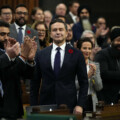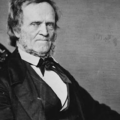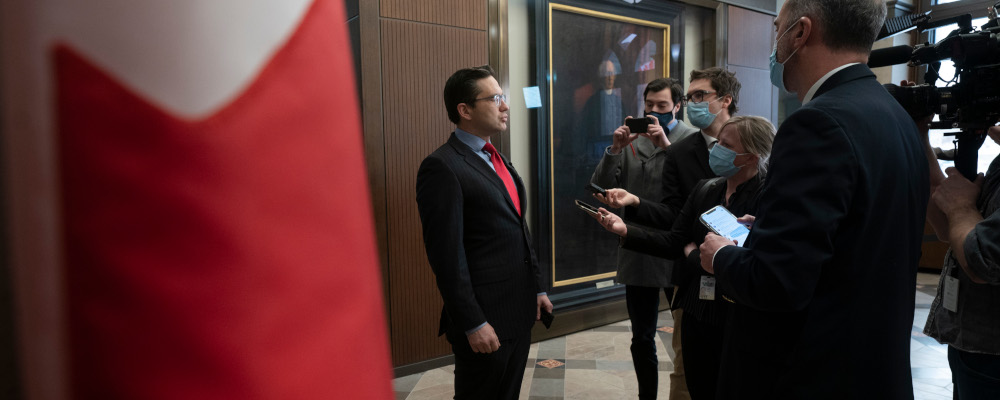Pierre Poilievre is the heavy favourite and clear frontrunner to be the next leader of the Conservative Party. Facing off against a government that will likely be close to a decade old at that point, there’s a good chance he may well be the next non-Liberal prime minister.
Unlike the last Conservative leadership race in which the supposed frontrunner Peter MacKay ended up losing, Poilievre’s status as frontrunner is not simply a media narrative. He is a darling of partisans and the Conservative base, and his name recognition and social media popularity dwarf that of any other federal Conservative politician. Unless something unexpected happens, he will be the next Conservative leader.
This gives Poilievre the luxury of being able to look ahead a bit, and think about his campaign a bit differently than other prospective candidates. The fatal flaw of his predecessor, Erin O’Toole, was probably running a leadership campaign as one thing and then pivoting to something else in order to win a general election. It didn’t work and he’s now gone.
Poilievre would be wise to avoid the mistakes of his predecessor and try to figure out a way to campaign for and win the Conservative leadership and then use and build upon that foundation in a general election. But this is much easier said than done of course. The selectorate that elect Conservative leaders is quite different than the broader voting population. So how can he thread this needle? Fortunately for Poilievre, he may already have the answer.
Last spring, Poilievre gave a speech from the floor of the House of Commons he called “The Gatekeepers” that he also tested out on his social media accounts. It got fairly positive attention at the time, and Poilievre should return to it and expand upon it. This gatekeepers message could form the basis of a vision and agenda not just for his leadership campaign, but for his prospective leadership of the party itself. It is a compelling message, one that likely has wider appeal whilst also threading the needle and being appetizing enough for the Conservative Party base.
In the speech, Poilievre basically outlines how powerful interests and voices exercise their influence at the expense of the broader society, including those who lack similar pedigree or connections. He starts, for instance, by going after progressive downtown NIMBYs who prevented an expansion of the Billy Bishop Airport in the City of Toronto and then moves into NIMBYs that are locking a generation out of the housing market in major cities across the country.
He then targeted Bank of Canada governor Tiff Macklem for a letter he sent to a zoning review process to prevent the construction of a daycare in his wealthy Toronto neighbourhood. Basically no one who uses his or her power to advance their interests at the expense of the community is spared. Poilievre goes after bureaucrats stifling entrepreneurs and business owners, rent-seekers demanding public policy tilt in their favour, and politicians who oversee the whole system as a matter of political self-interest or class affinity.
He explicitly discusses the rising dislocation and hopelessness many young Canadians feel about their economic prospects in this country. He goes after petty bureaucrats with absurd rules that make people’s lives harder and prevent Canadians from helping each other, such as a man taken to court by city hall for trying to build a shelter for homeless people. He goes after activists preventing economic development on Indigenous land. Interprovincial trade barriers are attacked. Poilievre essentially paints a picture of bureaucratic and well-connected elite gatekeepers who are stifling growth and opportunities for ordinary people.
Let’s start with why it’s a winning conservative message for his leadership campaign. The conservative movement in Canada has always been relatively fractious, but real fissures are emerging in it right now that cut deep and pose real challenges for Conservative leaders. The gatekeepers message checks a lot of boxes that should be able to keep different divides in this fractious coalition happy.
It allows Poilievre to hit a lot of bread and butter issues for the Conservative base, things like red tape and bureaucracy, deregulation, small government, and economic issues. This remains the way that many Tories think of themselves and what their conservatism is ultimately about. But the way it’s framed, attacking gatekeepers purportedly holding ordinary and hard-working Canadians back, has an undeniable populist edge to it.
The rhetorical hallmark of populism is to build narratives around a people versus an elites framing. It can take many different forms, and who these elites and people are varies widely depending on the populist we’re talking about. The elites in this message are essentially political elites whose actions hold back the so-called “little guy”—ordinary Canadians who just want to own a home and make a living. There is undoubtedly something of a populist moment in the Canadian right at the moment, and this is a particular framing that can resonate with the Tory base whilst not giving in to the darker and more sinister populist temptation.
Canada’s chattering classes will most likely chafe at this message, and while it may not please the bien-pensants, it is one that is perfectly within the realms of legitimate democratic rhetoric. If anything, it may be a healthy way of releasing some steam on the building populist anger. More importantly, this message, whilst pugilistic, is not dark in the way populist rhetoric can be and isn’t going to automatically alienate anyone who isn’t already on board with this. It has the potential, done right, to resonate with a wide swathe of the population that isn’t just the traditional older, whiter, and more rural Conservative voter base.
The Hub’s editor-at-large Sean Speer has written persuasively that the present moment is one in which progressive ideas are firmly ascendant. The pandemic brought about an expansion of government involvement in people’s lives along with much necessary additional public expenditure, which has put conservatives on the backfoot. This gatekeepers message might allow Poilievre to push back on this by shifting the political agenda to basic issues of affordability, cost of living, the housing crisis, sluggish economic performance, and questions about jobs and the economy more broadly. These are much more comfortable issues for Conservatives like Poilievre, and these are issues of concern for many Canadians now.
Conservatives have tried this before. Affordability was a key part of Conservative messaging in the 2019 federal election. It didn’t have the breakthrough effect Conservatives would have been hoping for, but in case you haven’t noticed, the world has changed a fair bit in the subsequent years. This message may not have resonated the way Andrew Scheer and his team would have hoped for in 2019, but it could land differently today especially if framed under the broader gatekeepers umbrella.
In the Liberals, Poilievre’s Conservatives have a perfect opponent for this message as well. The Liberals seem uninterested in seriously addressing questions of economic growth and affordability, and as the natural governing party they are undoubtedly the party of Canada’s elites. Aiming at these gatekeepers could be a potent strategy against a Liberal Party approaching a decade in government, with more than one scandal under its belt that involved benefits for well-connected friends.
The kinds of people Poilievre can reach with this message might not be the typical people you would expect, but could help build a somewhat idiosyncratic and surprisingly potent electoral coalition. The Hub contributor Karamveer Lalh put together a good Twitter thread that illustrates well exactly what this coalition could look like. It isn’t what you’d expect based on some abstract narratives of the left behind people of Canada, it’s something different. As Lalh explains, “there is a class of folks who feel left behind by the current financial reality. Who are these folks? They’re young people who live in suburbs, particularly the suburbs of Vancouver and Toronto i.e. the most important electoral region in the country…These folks can’t afford to move out of their parent’s homes. Well no kidding when single-family homes in Toronto proper cost upwards of $1M. Joe Toronto makes $70k a year after piling on a bunch of college debt?”
Lalh also explains well the connection between this world and the growing world of cryptocurrency, in which there is growing interest from the Conservative Party and Poilievre himself, whose criticisms of the Bank of Canada have earned him much admiration amongst the “crypto bros.”
Ultimately these ordinary Canadians are ethnically diverse, live in the electoral battlegrounds of Canada, and are alienated and frustrated with a Canada that seems to them to be holding them back. These are the kinds of people the gatekeepers message is likely to resonate with. And this group of people wedded to the traditional Conservative coalition could be a serious electoral force.
Put all this together, and Poilievre may have the makings of a perfect storm message. It scratches the itch of different parts of the conservative coalition, and it has the potential makings of a winning electoral coalition that could propel the Poilievre-led Conservatives to government. Whilst appealing to both small government and populist types in the conservative movement, it also potentially offers a populist message that appeals to people who feel left behind or screwed over in Canada today, with ire aimed at a clique of gatekeepers who frustrate the goals and aspirations of ordinary Canadians.
Building around this gatekeepers message also allows Poilievre to overcome the perils of authenticity politics. People generally want and like political leaders that come across as authentic, that seem genuine, and don’t come across as B-list actors just performing a role. The nature of authenticity of course is that it can’t be faked. Inauthenticity can’t be overcome by good comms and messaging strategies. Poilievre is something of a fiscal hawk and has a clear populist streak in him.
This kind of messaging and approach comes naturally to him; it doesn’t require him to be something that he isn’t. While Poilievre may not be to everyone’s taste, especially those who are already predisposed to dislike Conservatives, he may already have struck on a message that could form the basis of a winning strategy that addresses the increasingly central issues to many Canadians.
Recommended for You

Take the Alberta separation threat seriously, Canada

Canada’s courtship of Qatar raises hard questions for Carney about values and security

Hospitals across Canada are in the red—but simply sending them more money is the wrong solution

Pierre Poilievre secured a resounding win—here’s why: The Weekly Wrap



